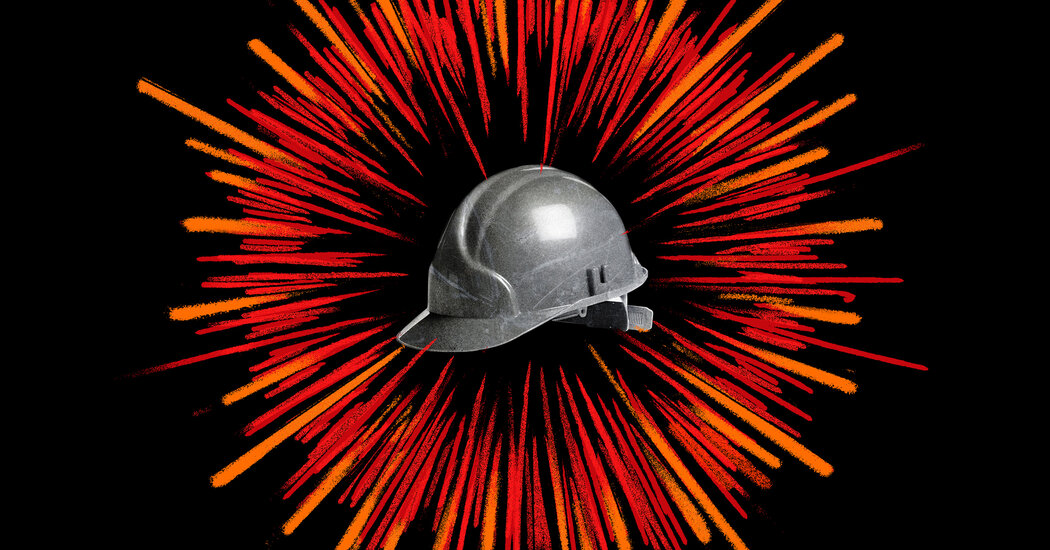Just $15,615. That’s how much a $52 billion meatpacking company was fined by the federal government for unsafe conditions that led to the deaths of eight workers.
Even as the dangers and virulence of the coronavirus have become more glaring, infecting 6.5 million Americans and killing nearly 200,000, the nation’s top worker protection arm has been asleep at the wheel. The Occupational Safety and Health Administration has issued only guidelines, rather than establish enforceable rules, for businesses that rushed to reopen when they were deemed essential early in the pandemic, putting hundreds of thousands of employees in workplaces where the virus could easily spread.
Now, after six months of near silence on the issue, OSHA has begun issuing fines for the meatpacking industry, which is responsible for some of the nation’s largest coronavirus outbreaks. But if the agency’s first major actions are meant to chasten corporate America, executives aren’t likely to get the message.
At the Greeley, Colo., Swift beef plant where eight workers have died from the effects of coronavirus, OSHA found that the operator, JBS Foods, failed to maintain a safe working environment. In a release Friday night, OSHA also cited the company’s lack of timely disclosures about illness and injuries after a May inspection.
Also last week, OSHA slapped the wrist of Smithfield Foods, which in April was forced to close its Sioux Falls, S.D., plant to help contain an outbreak that ultimately killed four workers and infected about 1,300.
The company initially sued to prevent OSHA from examining documents. Smithfield, the world’s largest pork producer, even caught the attention of the Centers for Disease Control and Prevention, which cited densely packed workers and inconsistent testing regimens.
The fine? A mere $13,494. Last year, Smithfield took in $13.2 billion in sales. (Both JBS and Smithfield have said they plan to contest OSHA’s findings.)
Compare that to the $40,482 that OSHA fined a chain of Ohio nursing homes where seven workers contracted the virus. Or California’s division of OSHA, which issued a combined $436,155 in fines against the frozen food manufacturer Overhill Farms and a contractor for failing to provide barriers or sufficiently space workers.
The relatively minuscule federal OSHA fines for meat processing companies stem from the unwillingness of its parent agency, the Labor Department, to halt the flow of commerce, particularly as President Trump has played down the risks of the coronavirus — though he knew in February that the virus was deadly and could easily spread. Amid a growing number of reports of coronavirus outbreaks at meat processors, Mr. Trump in April ordered the plants to remain open.
OSHA has issued only general guidelines based on C.D.C. recommendations that were never mandatory, leaving businesses without clear direction but also few worries about enforcement. In June, OSHA fended off a lawsuit filed by the A.F.L.-C.I.O. that would have compelled it to issue emergency rules for workplace safety.
Had OSHA rolled out enforceable rules in April (as it did during the H1N1 flu outbreak in 2009) around social distancing, mask use and sanitation, it could have helped prevent the spread of the coronavirus and many needless deaths in warehouses, grocery stores and meatpacking plants.
Even now, OSHA could adopt temporary standards on reporting requirements and sensible safety codes.
Instead, it is relying on a rarely used regulation known as the “general duty clause,” which requires employers to keep the workplace free of “recognized hazards that can cause death or serious harm.” Using different enforcement standards, OSHA levied an $87 million fine against the gasoline producer BP following a 2005 explosion at a Texas refinery that killed 15 people. (The company later settled for $50.6 million.)
Throughout the pandemic, OSHA has failed to act on thousands of coronavirus-related complaints, relying largely on self-reporting from companies seeking to forestall inspections. Workers at a Pennsylvania meatpacking plant sued OSHA in July, saying the agency failed to respond to complaints about their dangerous workplace.
Now that it has proposed fines that will cost multibillion companies less than a seven-course dinner for 12 at Disneyland, no corporation should fear OSHA.
Mitch McConnell, the Senate majority leader, also has worked to carve out further protections for businesses by holding up a stimulus package until corporations are shielded from coronavirus-related liability. That’s a strange priority, given that regulators are unwilling to impose meaningful fines on businesses that violate existing law.
The nation faces a perilous autumn and winter as restrictions are again being lifted for businesses to allow for barbering, bowling, big screen movies and in-restaurant dining as well as the return to classrooms and campuses for millions of students. College towns are seeing an alarming uptick in coronavirus cases — the virus’s spread has simply not been contained.
Simple changes, such as barriers between workers, face mask requirements and social distancing protocols, can help prevent spread on the job. But without the threat of real enforcement from the nation’s top cop for worker safety, there is little incentive for businesses to change their ways to better protect their employees and their communities.
The Times is committed to publishing a diversity of letters to the editor. We’d like to hear what you think about this or any of our articles. Here are some tips. And here’s our email: [email protected].
Follow The New York Times Opinion section on Facebook, Twitter (@NYTopinion) and Instagram.



















